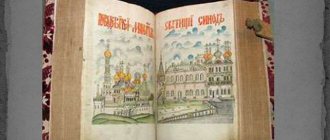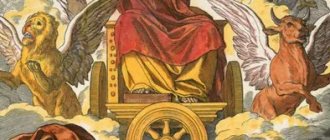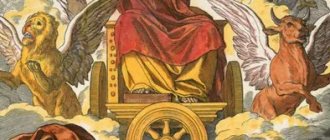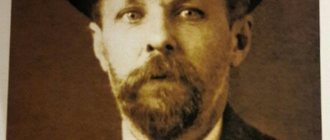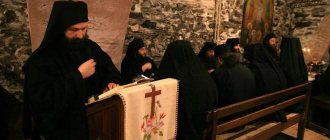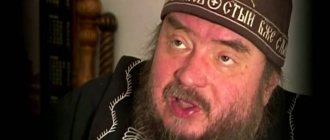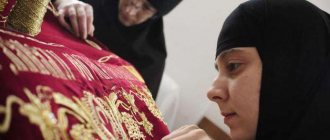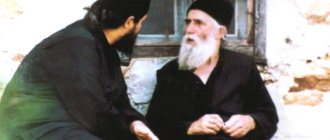The meaning of the predictions of Saint Cosmas
Every village where the venerable saint appeared retains the enormous power of his word. Most of the predictions reached the minds of contemporaries through written texts, some are known only orally. Many Orthodox Greeks were brought up on the teachings of St. Cosmas of Aetolia, and all these people unquestioningly believe the prophetic words of the great servant of the Lord.
Equal to the Apostles Cosmas of Aitolia
- Some prophecies of the saint are almost always associated with certain territories, and cannot be understood without appropriate knowledge of the historical context. Other ideas intersect with the fate of the Orthodox religion and modernity.
- The prophecies of Cosmas of Aetolia became extremely popular and vital for the Greek people. Orthodox believers did not forget about the predictions even during the period of persecution of Christianity, when they managed to “hide” the fateful words of the saint in the Koran.
- The main task of the Old Testament prophets was to predict the descent to earth of the Messiah in the form of a man. The New Testament saints spoke about the imminent end of the world and the second coming of the Savior.
- Cosmas of Aetolia belongs to the latter, therefore his prophecies are regarded as preparing Orthodox believers for Armageddon (Last Judgment) and the return of Christ to earth.
- The saint's predictions make it possible to find out the future and come to terms with the idea of approaching difficulties and temptations. Christians, starting from the prophecies of the New Testament saints, remember their main goal - a favorable response at God's Judgment for their own actions.
More articles about prophecies:
- Prophecies from the Bible: Predictions about the End Times
- Prophecies and instructions of Elder Lawrence of Chernigov
Saint Cosmas experienced great pain for his homeland and universal Orthodoxy; he was an outstanding missionary who led all those worthy of it to the teachings of Christ.
On a note! The venerable elder showed by his deeds and prophecies that love for the Lord is impossible without the same love for His sons and daughters. He clearly demonstrated great respect for his surroundings, playing a dangerous game with his opponents and not demanding reward for the good he had done.
Predictions about the liberations of the Greeks
Cosmas' prophecies returned to his compatriots, who had suffered a difficult fate under the 300-year foreign yoke, great hope for the revival of the nation's freedom. The venerable saint made a huge contribution to the cause of liberation from the power of the Turks in Greece. The people sing the glory of Cosmas and ask him to return the St. Sophia Temple to Greek Orthodoxy.
Sermon of Saint Cosmas
- The saint became a symbol of Greek Orthodoxy in the struggle for liberation from foreign views. People never tire of being inspired by prophecies that give faith and hope. Cosmas in his prophecies veiled the term “national liberation” with the word “desired for the people.”
- Answering a question about this “expectant”, the reverend prophet said that the state would again become Orthodox, and every inhabitant of this country would rejoice. With these words he reassured his enslaved compatriots. Soon the territory of the Balkans was freed from the Turkish yoke.
- Saint Cosmas told the inhabitants of Epirus (the region on the border of Greece and Albania) that what they “wanted” would be in the third generation. The liberation of this province occurred after the war of 1912. The saint prophesied: people will live independently when a gap in a certain tree is healed or the celebrations of the Annunciation and Holy Easter coincide. These signs came true, and the Greeks gained their long-awaited freedom.
- He advised the inhabitants of Albania to hide in the mountains, since their hometowns were soon subjected to military invasions. People listened to the elder, this helped save many innocent lives.
- Cosmas of Aetolia prophesied that the Ionian Islands would be owned by the Venetians, and then by the French and English. And only in 1954 will the local residents be liberated from the foreign yoke.
- The saint foreshadowed that fascist Italy would invade Greek territory without encountering military resistance. Having reached the cross, on the site of which Cosmas prophesied, the enemies will be afraid of further advance. Residents, remembering the elder’s slander, did not leave their homes during the war. The Italians stopped at the cross, having received rebuff from the Greek army.
On a note!
The prophecies of the righteous saint were filled with phrases about wars, famines, disasters and various tragedies. In his sayings, pious Christians find practical advice that helps them maintain their faith and survive certain adversities. The purpose of any prediction of the monk is not to scare faint-hearted listeners, but to warn contemporaries and future generations about upcoming misfortunes. Several generations of Balkan residents used his advice.
The time will come
The prophecies of Saint Equal-to-the-Apostles Cosmas of Aetolia (September 6 / August 24, Art. Style) were commented on the Pravoslavie.Ru portal by Afanasy Zoitakis, associate professor of the Faculty of History of Moscow State University, author of a monograph on the saint.
The world learned about the prophecies of Saint Equal-to-the-Apostles Cosmas of Aetolia thanks to unprecedented popular veneration. Living in the 18th century (we recently celebrated 235 years since his death and 300 years since his birth), Cosmas of Aetolia was glorified by the Church not so long ago - in the middle of the 20th century. But the people never doubted that he was a saint. Therefore, he carefully preserved everything that related to the memory of the saint, painted his icons and remembered his every word, passing it on from generation to generation.
Many objects associated with Saint Cosmas of Aetolia have been preserved: part of the vestments, and metal and wooden crosses that he left at the places of his sermons1.
The colossal problem of those times was Islamization: living among Muslims, many Orthodox Christians voluntarily converted to Islam. The discussion was about the fate of Orthodoxy in the region. Saint Cosmas walked throughout most of the canonical territory of the Patriarchate of Constantinople, preaching the Gospel to people who once knew the word of God, but had largely lost their faith and moved away from the Church.
Sermon of Saint Cosmas
Modern historiography calls Saint Cosmas of Aetolia the man who stopped the mass Islamization of Orthodox peoples. He is rightly called Equal-to-the-Apostles, but not only for this reason.
It is known that Saint Cosmas performed many miracles. One of the most amazing is when he, throwing part of his vestment onto the surface of the lake, moved to the other side. We also know many posthumous miracles: those who resorted to his prayerful intercession know that Saint Equal-to-the-Apostles Cosmas of Aetolia is an ambulance.
Like the apostles, he was awarded the crown of martyrdom. And like them, he had the gift of prophecy.
About 200 prophecies of Saint Cosmas are known - and all of them have either been fulfilled or are awaiting fulfillment
We know about 200 prophecies of Saint Cosmas - and all of them have either been fulfilled or are awaiting fulfillment2.
It must be said that his outstanding prophetic gift was appreciated not only by Christians, but also by Muslims. This is evidenced by the so-called Albanian manuscript - a collection of 72 prophecies recorded in the Koran in Albanian.
Reliability of prophecies
The reliability of the prophecies has been established. As historians, we, first of all, rely on written sources, and from early times - the end of the 18th - beginning of the 19th centuries.
The oral tradition cannot be denied - a lot in Orthodoxy is transmitted orally - but in this case the selection takes place based precisely on written documents.
The stone on which Cosmas of Aetolia stood during his sermon
Many prophecies were written down either by contemporaries or shortly after the martyrdom of Saint Cosmas, so we can claim that they were pronounced by Saint Cosmas and carefully preserved by his disciples.
Practical benefits
Prophecies were and remain a guide to action - either for all people, or for the inhabitants of a particular locality where he preached.
We know of more than ten region-specific prophecies in which people were told what to do in a given situation.
“When a tree falls, go to the mountains, many people will be saved there, don’t take anything with you, save yourself, the trouble will last no more than 24 hours.”
Indeed, the people of the place where this was said found refuge in the mountains and saved their lives from the Turks, according to the word of Saint Cosmas.
Another prophecy came true during World War II.
Saint Cosmas preaches. Fresco
“Trouble will reach the cross, but will not go lower.”
We are talking about the cross left by Saint Cosmas at the place of his sermon (by the way, many places in Greece are called “Stavros” - “Cross”, because the saint preached at this place).
One 94-year-old man remembered this prophecy, which he had heard from his parents, and when the Italian troops were advancing, he refused to evacuate, calling on his fellow villagers to do the same. By this, he displeased the authorities - he was even accused of sabotage. Fascist Italy was advancing, the Greek army was defeated, but, according to the saint’s word, the Greeks really fought back and did not allow the Italians to go “below the cross” and capture this village. People were not disgraced in their trust in the word of the saint.
Classification
A varied classification of prophecies is possible, but now we would divide them into groups like this.
1) Prophecies about the liberation of the territory of the Patriarchate of Constantinople from the Ottoman yoke at the time when Saint Cosmas preached - then it included not only Greece, but also the lands of Albania and Turkey, where Orthodox peoples lived.
These also include prophecies about the liberation of Constantinople.
Most of these prophecies - about the liberation of Greece - were fulfilled. Those concerning Constantinople are still awaiting their execution.
2) Prophecies about future events - wars, disasters - and what will happen to all humanity.
Many of the prophecies, which, as we now understand, belonged to the distant future, were preserved only because people loved the saint very much and completely trusted him.
“A cart without horses will run faster than a hare.”
It is clear that in the 18th century this sounded unclear and even absurd. Just like the prophecy that it will be possible to talk to a person in another city as if he were sitting in the next room:
“The time will come when people will talk from one distant place to another, for example from Constantinople to Russia” or “The time will come when people will be able to communicate with each other over long distances, as if they were in two adjacent rooms.”
Constantinople prophecies
When the prophecy is fulfilled, it becomes clear exactly what the saint meant, but while it waits in the wings, different interpretations are possible3.
The leading expert on Turkey, Professor at the University of Ottawa Dmitry Kitsikis, commenting on recent events, says that the prophecies of Cosmas of Aetolia about the collapse of Turkey are being fulfilled before our eyes.
Istanbul. Modern photo
“The Turks will leave, but will return again and reach Eksamilia 4 . Of these, one third will perish, one third will believe in Christ, and one third will go to Kokkini Milia.”
A third of Turkey's population (25 million) are Alawites, the professor says, who have a positive attitude towards Christianity. We should not forget about the large percentage of secret Christians. As for the third of the population that is said to go to Kokkini Milya, then, according to the professor, we are talking about the creation of the state of Kurdistan.
This also intersects with the interpretation of Paisius the Holy Mountain, who loved Saint Cosmas very much. Saint Paisius interpreted this same prophecy in more detail. He said that Six Miles is six miles of sea shelf where the interests of Turkey and Greece constantly collide. Because of these six miles, such a serious conflict will ultimately occur, in which major world powers will intervene, which will ultimately lead to the fall of Turkey.
Prophecies about our time
“The time will come when you will not recognize anything.”
It cannot be argued that these words refer specifically to our time, but it is now quite obvious that in Western Europe and the United States - and not only - the media manipulate public opinion. In Western Europe, very little is known about what is really happening in Ukraine or Syria - just as no one knew about what was really going on in Yugoslavia. Of course, if you wish, you can find information on the Internet and get to the bottom of the truth, but it is almost impossible to find out from the Western media.
“There will be things in schools that your mind won’t be able to comprehend.”
Indeed, we see that in schools in the West things are beginning to appear that the mind refuses to accommodate - for example, lessons in “tolerance” towards homosexuals and entire curricula dedicated to this.
“Trouble will come to you from the educated”;
“What you have to endure will happen to you because of people who are well-read.”
“What you have to endure will happen to you because of people who are well-read.”
“Well-read” is the key word here. With all one's best will, one cannot accuse Saint Cosmas of being against education: he founded about 1000 schools, found funds to finance them, trained teachers, opened four educational institutions for training teachers and priests, and together with Nikodim Svyatogorets and his other associates published educational literature. And at the same time he said these words. What are they talking about?
That mere knowledge - “reading”, erudition - is not enough: relying only on one’s own reason, on one’s “I”, on one’s egoism leads a person to a dead end.
Indeed, one has to endure a lot because of these well-read people.
The origins of modern post-Christian European civilization lay in the European Enlightenment with its rationalism and critical attitude towards religion. If you read modern liberals, they think and act in the same vein as their predecessors - Voltaire, Rousseau and others.
Saint Cosmas was an opponent of the European Enlightenment5.
He said that Divine enlightenment was necessary. In addition to being well-read, spiritual knowledge is necessary, which is achieved through the experience of church life. No matter how well-read and erudite a person is, he can be compared to a house that only has a foundation. If there are no walls, no roof, then this is a rather meaningless structure. The same can be said about people who try to do everything themselves, without God. This always leads to a dead end - and often not only to these people themselves, but also to entire nations and countries.
“The springs will dry up and the rivers will become dirty.”
In many regions today there is a shortage of drinking water and unprecedented pollution - there is nothing to comment on here.
“Your plates will be filled to the brim, but the food will be impossible to eat.”
A very accurate and amazing prophecy. In the 18th century, it was completely incomprehensible how this could happen: the plates were filled with food, but it was impossible to eat it. Now we see it: genetically modified products or products stuffed with preservatives, “tasting” something that is simply not in them. Sufficiently wealthy people can still find some more or less natural products, but perhaps every year this will become more and more difficult.
“We will see our land turn into Sodom and Gomorrah.”
Various forms of legalization of same-sex cohabitation, in some regions - permission for gay couples to adopt children, propaganda of all this throughout the world... - the process of turning our land into Sodom and Gomorrah is underway, and we all see it.
“The time will come when the devil will circle the world on his “thingy.”
Global surveillance, control over people - this is how this prophecy is usually deciphered. We can identify this “thing” with a system of satellites that conduct total surveillance visually or by providing services to users to maintain various types of communications.
“The time will come when the world will be ruled by αλαλα and μπαλαλα.”
Αλαλα and μπαλαλα are a play on words. It can be translated as something soulless. Most interpreters link the prophecy to the modern information society, when computer technology underlies technological processes and the operation of mechanisms.
“The time will come when the whole world will be girded with one thread.”
Previously, this was understood as a telegraph, but today, of course, they talk about the Internet: a thread, a web.
“After the World War, people will eat with golden spoons.”
Previously - 40-50 years ago - there were discrepancies regarding this prophecy, but today all interpreters agree that this refers to the period after the Second World War, when prosperity began in Western Europe and the United States and when the cult of consumption arose.
“You will see some moving up and others moving down.”
Migrants
This is a prophecy of mass migration. For the Greeks, “up and down” are always south and north. Another prophecy says this directly:
“When you see how some move to the south and others to the north, it will already be close.”
“It will be close” can be understood in two ways. Saint Cosmas uses these words when he talks about the liberation of the Fatherland from foreign yoke. But we also find this expression in him - “it will already be close” - when he talks about the times of the Antichrist.
We do not know about what times this is said, because the context is unknown: where the prophecy was pronounced, under what circumstances.
Large-scale migrations of peoples have, of course, happened before, but the main thing here is “up and down” – south and north: the multidirectionality of the process and its intensity is what is worth paying attention to. And now we are really seeing a multidirectional process. When migrants from Eastern Europe poured into the European Union, it was migration from the north. Now we see migration from the south, and the desire of some neighbors to move to Europe (including Southern Europe) - for example, to earn money.
“Woe to Greece when foreign peoples settle on its land.”
This is definitely our time. Saint Cosmas never contrasted the Greeks with other Orthodox peoples, so here we are talking about non-believers. Greece has always been a fairly monolithic state in an ethnic sense, but this is changing right before our eyes: every day thousands of Muslim migrants arrive in the country.
In one of the prophecies, Saint Cosmas expresses himself not entirely politically correctly:
“Filthy nations will come; when they appear, do not be afraid; when they leave, stand aside.” We will not comment on the first part, but the second part inspires some optimism in those who suffered from these processes: it means they will leave sooner or later.
“They will lend you a lot of money and demand it back, but they won’t be able to take it.”
Greece was indeed given a lot of loans, they demanded them back, but they will not be able to take them back - this can be interpreted in the sense that Greece’s debt is only growing, despite all the measures taken. This interpretation is common in modern historiography.
“Even chickens and windows will be taxed.”
“Even chickens and windows will be taxed”
Previously, this was usually understood figuratively.
Now - literally. Since the onset of the crisis in 2009, in order to avoid tax evasion, the Greek government began sending tax demands in receipts for electricity payments. In cases where people could not pay, their electricity was cut off. At the end of 2012, chicken coops were also included in the list of taxable property (taking into account the number of chickens) - the first part of the prophecy literally came true.
In October 2013, the second one came true. The new edition of the real estate tax (which has been increased several times) also includes such a parameter as the number of windows in the house (the more there are, the higher the tax).
Saint Cosmas of Aitolia
“The time will come when the wet will burn along with the dry.”
The innocent will be forced to share sorrows and troubles with the guilty. When punishments are sent down from God and humanity incurs disasters with its thoughtless behavior, innocent people will also suffer them.
Saint Cosmas said that there is no need to be afraid of this. Many are afraid of the end times, focusing on the negative aspects.
Saint Cosmas warns about difficult events: there will be wars and troubles - he did not hide this. But at the same time he said that with Christ, with the Church, nothing is scary. Even if he has to endure martyrdom, an Orthodox person should not lose heart or be afraid of it.
We see this in his prophecies, and even more so in his teachings6: nothing can separate a person from Christ except the person himself.
“The time will come when your enemies will take away even the ashes from your hearth. But do not betray your faith, as many others will do”;
“Whatever you have, give it all away, take care only of your souls.”
This is a very important call. All material benefits, convenience, stability are illusory, there is no place for earthly things in the future - “care only about the soul and Christ.”
Predictions of Cosmas about Constantinople
The return of this majestic city to universal Orthodoxy was the dream of many peoples. Cosmas of Aetolia predicted the revival of Constantinople, these prophecies are waiting in the wings. For Orthodox people, Byzantium is not only a religious stronghold, but also a way of thinking and worldview. It is here that the symbol of Saint Athos originates, which has the potential to revive Constantinople.
Equal to the Apostles Saint Cosmas of Aetolia
- Cosmas predicted that the Turks would be driven out of the city by soldiers in red uniforms. During the liberation, a lot of blood will be shed. The saint said that the Constantinople issue would be closer to being resolved when the Orthodox fleet sailed across the Mediterranean Sea.
- An army that does not know the Greek language, but believes in Christ (perhaps it will be the Russian army) will march on Constantinople. During this period, it is best for local residents to hide in the mountains nearby. The city will not be taken by the Greeks, but by other troops, and it will be given to them.
- The Turks will be driven to a place located somewhere in Mesopotamia. A third of Turkey will perish, the second third will convert to the Christian religion, and the rest will remain in exile.
Prophecies about the modern world
Many of the wise old man's predictions originate in modern times and may reveal their potential over time. The saint clearly hinted about high taxes for residents, concealment of truthful information, wars and deceitful bureaucracy - which we see already today.
- In the 18th century, Cosmas of Aetolia prophesied the appearance of warplanes bringing death from the skies. People will hide in underground shelters from these “terrible monsters.”
- The saint said that a dark time would come when many people would stop receiving the necessary information. Newspapers, radio and TV present to residents only what is interesting to the government structure from a financial point of view. Serious publications gave way to falsehood, low topics and all kinds of gossip.
- The saint predicted: thieves would stop hiding in the mountains and go to big cities, donning the clothes of civilians. He predicted that the tax would fall even on the heads of animals, and that food would become incredibly expensive. The saint said that a lending system would appear, according to which a person undertakes to return the money with a large percentage. However, the drafters of this scheme will not be able to achieve their goal.
- Cosmas of Aetolia saw a grandiose migration of peoples: the Turks would come to Epirus, the Greeks would occupy Constantinople (Istanbul), and the Serbs would leave Kosovo. The innocent will share their fate with criminals and murderers, and in order to save their souls it will be necessary to sacrifice everything material, remaining strong in their faith.
Hagiographic icon of Saint Cosmas of Aetolia
Hunger for knowledge
The century in which Cosmas the Aetolian was born was a time of great social and ideological upheavals. This is the age of Enlightenment, the postulates of which rejected all previous establishments of the Church and proclaimed the triumph of reason.
Saint Cosmas was born in 1714 in a village called Maga Dendro. This is a very small village in western Greece in the province of Aetolia, hence the nickname of the saint.
In general, this area was sparsely populated, the people were not well educated, and few knew how to read and write. At baptism, Saint Cosmas received the name Kostas. His parents were weavers, and most likely Kostas continued their work, if not for one circumstance - an unusual thirst for knowledge.
- Until the age of 20, he did not even know the alphabet, but he turned to the priest of their village, Anania, and he taught him to read and write, however, this basic knowledge was not enough for him.
- Having learned that the famous teacher Feofan lived not far from his village in the village of Agia Paraskeva, the young man rushed to him. Here Kostas stayed for eight years, and improved his knowledge so much that Feofan made him his assistant and sent him to teach in the village of Lobotino.
- In 1743, a theological academy, the so-called Afoniada, was opened on Holy Mount Athos.
Having learned about this, Kostas rushes to Mount Athos to receive higher theological education. Icon of Equal-to-the-Apostles Cosmas of Aetolia
On Athos, Panagiotis Palamas becomes Kostas' teacher. Under his leadership, the young man undergoes a full course of training and, after completing the course, goes to the Philotheus monastery, where he takes monastic vows, receiving the name by which the whole world recognizes him - Cosmas. In the monastery he was ordained first as a hierodeacon, then as a hieromonk.
Interesting fact! Saint Cosmas stayed in the Philotheus monastery for only two years. Realizing that his destiny was not in a purely solitary monastic life, he went to Constantinople, where the then Patriarch Seraphim II Arnaut, seeing in Cosmas of Aetolia a great missionary equal to the apostles, sent him to preach the word of God in Epirus.
